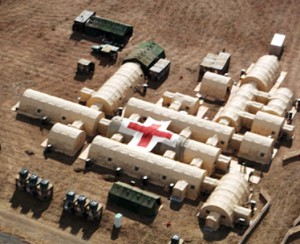 Wartime has always spurned great advancements in medical technology. In the midst of battle, doctors are exposed to more life and death situations, forcing them to make improvements. During the Revolutionary War (1775-1783), the medical community was not even aware of viruses, bacteria or how diseases were spread. Many of the ‘doctors’ did not even attend medical school, yet were put into the position of camp surgeon. Surgery was simple – since no anesthesia was available, an officer was given rum or brandy before a procedure and an enlisted man was given a stick to bite for the pain. Only 35% of the soldiers survived surgery. The Civil War (1861-1865) allowed the medical community to rethink their procedures. During the war 620,000 men lost their lives but two-thirds of them (about 409,000) died from diseases, not a wartime injury. As the war raged on, new medical practices were initiated: anesthetic for surgery, efficient field hospitals and better record-keeping systems. When America went to war in World War I (1914-1918), the army established a regular medical corps and improved treatments for the troops – blood transfusions, motorized ambulances, triage practices and x-ray equipment were added to assist the surgeons in the field. World War II (1939-1945) ushered in overwhelming advances like penicillin and other medicines, as well as skin grafting for burn victims. During the Korean War (1950-1953), Mobile Army Surgical Hospitals (MASH) were created, helicopters were used to transport the wounded, artificial kidneys became available, and vascular reconstruction was pioneered. The technology gained from more present-day wars includes the improved use of bandages to stop blood hemorrhaging (up to 85%), medicines and vaccines, advancements in prosthetics, and the practice of Regenerative medicine for severely wounded warriors. Medicine has come a long way since the Revolutionary War! Although wars are horrific events, without them medical practices would not advance so rapidly. The common thread, throughout history, is that man steps-up to the challenge of improving medicine and medical procedures during wartime to assist the troops and, eventually, benefit the general populace.
Wartime has always spurned great advancements in medical technology. In the midst of battle, doctors are exposed to more life and death situations, forcing them to make improvements. During the Revolutionary War (1775-1783), the medical community was not even aware of viruses, bacteria or how diseases were spread. Many of the ‘doctors’ did not even attend medical school, yet were put into the position of camp surgeon. Surgery was simple – since no anesthesia was available, an officer was given rum or brandy before a procedure and an enlisted man was given a stick to bite for the pain. Only 35% of the soldiers survived surgery. The Civil War (1861-1865) allowed the medical community to rethink their procedures. During the war 620,000 men lost their lives but two-thirds of them (about 409,000) died from diseases, not a wartime injury. As the war raged on, new medical practices were initiated: anesthetic for surgery, efficient field hospitals and better record-keeping systems. When America went to war in World War I (1914-1918), the army established a regular medical corps and improved treatments for the troops – blood transfusions, motorized ambulances, triage practices and x-ray equipment were added to assist the surgeons in the field. World War II (1939-1945) ushered in overwhelming advances like penicillin and other medicines, as well as skin grafting for burn victims. During the Korean War (1950-1953), Mobile Army Surgical Hospitals (MASH) were created, helicopters were used to transport the wounded, artificial kidneys became available, and vascular reconstruction was pioneered. The technology gained from more present-day wars includes the improved use of bandages to stop blood hemorrhaging (up to 85%), medicines and vaccines, advancements in prosthetics, and the practice of Regenerative medicine for severely wounded warriors. Medicine has come a long way since the Revolutionary War! Although wars are horrific events, without them medical practices would not advance so rapidly. The common thread, throughout history, is that man steps-up to the challenge of improving medicine and medical procedures during wartime to assist the troops and, eventually, benefit the general populace.
Previous ArticleSlow Motion
Next Article Driver Rescues Trapped Man
SharLeigh
SharLeigh has an inquisitive nature – she is interested in current events, history, science and many more subjects, including things that go bump in the night! Since 1997, SharLeigh has scoured the internet, looking for interesting, fun and timely topics covering all sorts of human-interest subjects for her articles from her home in Fontana, CA.
